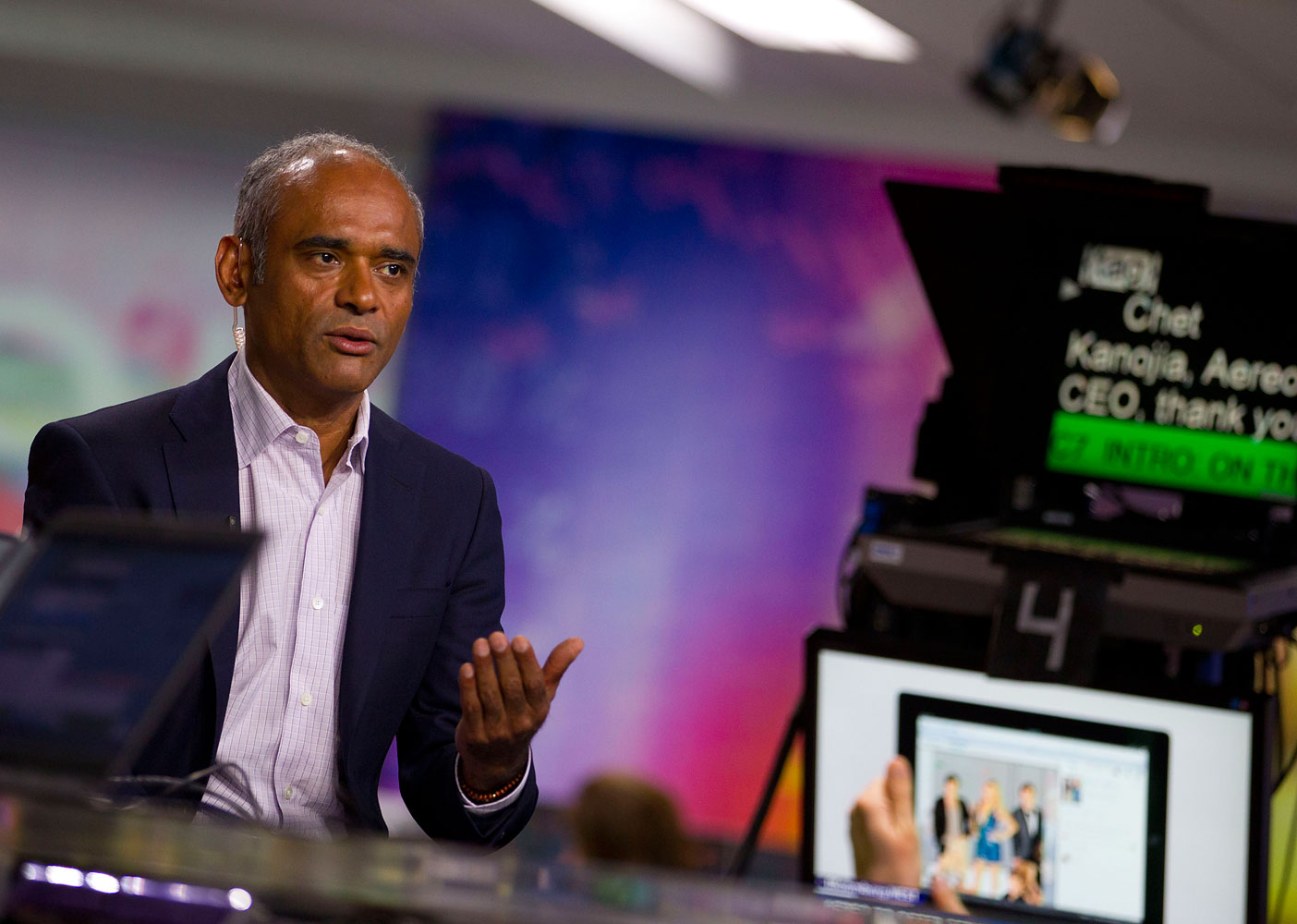
Updated 12:55 p.m. ET
Upstart Internet video company Aereo squared off against the nation’s largest TV broadcasters on Tuesday in one of the most closely watched Supreme Court cases involving the media business in years. The outcome of the case could have important implications for Internet streaming, cloud computing, and the future of the TV industry itself.
Aereo, a two-year-old startup backed by media mogul Barry Diller, has infuriated the major broadcasters because the company pays nothing to capture free, over-the-air TV programming using thousands of dime-sized antennas that are rented to individual users. Aereo then transmits that content to its customers over the Internet for $8-$12 per month. The broadcasters, including ABC, CBS, NBC and FOX, say this amounts to blatant theft.
If the Supreme Court rules that Aereo’s service is legal, the decision could throw a wrench into the highly lucrative broadcast business model, in which cable and satellite companies pay billions to the TV companies for the right to broadcast popular programming. Such retransmission fees are projected to reach $4 billion this year and $7.6 billion by 2019, according to research firm SNL Kagan.
The broadcasters say that an Aereo victory could prompt them to yank their programming from free TV and move it to pay channels like Showtime. The National Football League and Major League Baseball, which are supporting the TV companies, have threatened to take high-profile broadcasts like the Super Bowl and World Series to cable. Aereo says such a move would “disenfranchise” millions of Americans who still rely on antennas for local news and other programming.
After oral arguments Tuesday, a decision is expected some time in the summer.
Last year, two federal courts agreed with Aereo’s argument that it is transmitting thousands of legally protected “private performances” that individuals have captured using their own leased antennas housed in Aereo’s antenna farms. Those verdicts relied on principles established by the landmark 2008 Cablevision decision, which allowed remote DVR technology. But in February, a federal judge in Utah sided with the broadcasters, intensifying the legal uncertainty surrounding Aereo.
“Based on the Cablevision remote DVR verdict, a one-to-one relationship between the consumer’s copy or the antenna driving the stream to the consumer is what the law requires,” Aereo CEO Chet Kanojia told TIME in a recent interview. “We looked at that verdict and set out to comply with the law to the fullest extent possible, and we created a great technology that is solving a real consumer problem and bringing choice to the marketplace.”
The TV broadcasters say that Aereo is simply ripping them off. “Nothing about Aereo’s convoluted scheme of miniature antennas and gratuitous copies exempts its commercial retransmission service from the same rules that govern all others,” the companies wrote in their brief. “Aereo’s unauthorized retransmission of broadcast television to the public is obvious and unambiguous copyright infringement.”
Several prominent legal experts agree, including U.S. Second Circuit Judge Denny Chin, who called Aereo “a sham” and a “Rube Goldberg-like contrivance, over-engineered in an attempt to avoid the reach of the Copyright Act and to take advantage of a perceived loophole in the law.” Judge Chin made those comments in a dissent to the Second Circuit verdict that found Aereo’s service to be legal, and is now being challenged by the broadcasters in the Supreme Court.
In March, the Obama administration filed a friend of the court brief claiming that Aereo is “liable for infringement.” Last week, Diller, the billionaire media mogul who has poured millions of dollars into Aereo, blasted the White House for signaling “that the preservation of legacy business models takes precedence over lawful technological innovation.”
Meanwhile, several well-known public interest and technology advocacy groups have backed Aereo, including the Electronic Frontier Foundation, Public Knowledge, the Consumer Electronics Association, and Engine Advocacy. Dozens of prominent law professors and legal scholars are also supporting Aereo.
“Aereo simply provides an antenna for viewers to privately transmit free over-the-air broadcast television signals,” says Jodie Griffin, Senior Staff Attorney at Public Knowledge. “It does nothing more than make it easier for viewers to access already free broadcast service.”
Technology advocates warn that a ruling against Aereo could imperil cloud computing services offered by companies like Google, Amazon and Dropbox, because Aereo relies on the same legal principles as the entire cloud-computing industry, a point that Kanojia made in the TIME interview.
“The Aereo case puts the cloud at risk because when broadcasters have complained about Aereo, their complaints also describe cloud computing,” according to Matt Schruers, vice president for law & policy at the Computer & Communications Industry Association, which is supporting Aereo.
In their appearance before the Supreme Court on Tuesday, the TV broadcasters marshaled significant legal firepower to make the case that Aereo is illegal. The companies are represented by Paul D. Clement, the former Solicitor General under George W. Bush who is widely regarded as one of the most skilled and experienced Supreme Court lawyers of his generation.
More Must-Reads from TIME
- Why Biden Dropped Out
- Ukraine’s Plan to Survive Trump
- The Rise of a New Kind of Parenting Guru
- The Chaos and Commotion of the RNC in Photos
- Why We All Have a Stake in Twisters’ Success
- 8 Eating Habits That Actually Improve Your Sleep
- Welcome to the Noah Lyles Olympics
- Get Our Paris Olympics Newsletter in Your Inbox
Contact us at letters@time.com